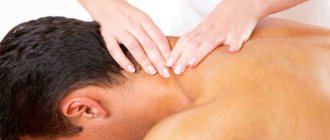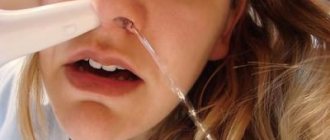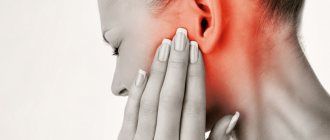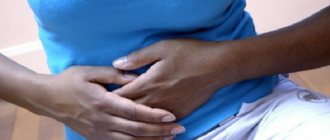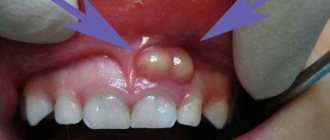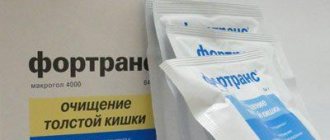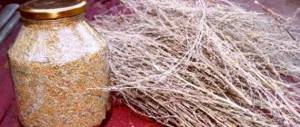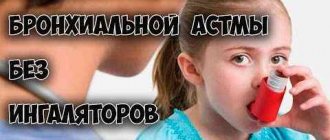Hello dear readers. It’s generally difficult to confuse a cold with something, because everyone is familiar with its symptoms. A sudden deterioration in your condition immediately makes it clear that the moment has come when it’s time to take out the first aid kit, which will probably contain some kind of anti-cold remedy. We think that we are able to cope with such a problem on our own, which is why we engage in self-medication, which does not always benefit the body. Therefore, at the first signs of a cold, you need to consult a doctor who will make the correct diagnosis, and therefore prescribe a course of effective treatment. But what if the first symptoms of a cold are already attacking you, and there is no way to get to the doctor? After all, it is closer to night that the temperature begins to rise, along with which other symptoms intensify. What to do in this case? How to eliminate the first signs of a cold in a child and an adult?
Everyone should know how to properly deal with the first cold symptoms in order to avoid complications.
When a sick person is not able to take care of himself, close people come to his aid, who should know how to provide first aid in such cases.
What is a cold
In the first days of a cold, we feel noticeable weakness, which by the evening develops into an increase in body temperature, accompanied by headache and chills.
Everyone knows that a cold affects the respiratory system, which is why some symptoms appear in the form of a sore throat or cough.
Many other diseases that are not colds can begin with the same symptoms. Therefore, self-medication in this case is quite dangerous.
After all, this way you can only waste time due to the treatment of a non-existent cold, while a more serious illness is already developing fully.
In addition, a false cold can be caused by various pathogens, for example, it could be a virus or a dangerous infection.
The treatment of each individual case will differ significantly in the group of drugs, the action of which is aimed at getting rid of a specific pathogen. Only a doctor can prescribe the correct treatment. You can and should also use folk remedies, but wisely and in moderation.
In addition, it is strictly forbidden to carry the disease on your feet, as this can cause serious complications.
The first signs are common to many types of colds, but subsequent symptoms will definitely help determine the specific type of illness.
Once the diagnosis has already been made, the following manifestations may occur:
Laryngitis is characterized by damage to the tissue of the vocal cords, causing the voice to become hoarse. This may lead to partial or complete loss of voice, which will be temporary.
Pharyngitis occurs against the background of an inflammatory process in the nasopharynx, which causes a characteristic sore throat. In addition, the patient complains of a sore throat and difficulty swallowing.
Rhinitis is characterized by inflammation of the nasal passages and sinuses, due to which the glands of the nasal mucosa produce large quantities of secretion, which we used to call “snot.” The patient's sleep is disturbed due to nasal congestion, due to which he cannot breathe normally.
We most often get sick during the period of weakening of the immune system, which occurs at the end of autumn and the entire winter period. Our body lacks vitamins that strengthen the immune system.
In fact, various infections surround us all the time, regardless of the time of year and temperature conditions.
It’s just that at certain times our immunity weakens, which opens up access to the body for various infections.
What factors contribute to the appearance of the first signs of a cold:
✔ Hypothermia of the body due to a sharp temperature change. Such changes are a significant blow to our immune system.
✔ Lack of essential vitamins during the cold season. In addition, the lack of sunlight also affects the weakening of the protective function of our body.
✔ Stressful situations can be associated with a sharp restructuring of the body from “vacation” mode to “work” mode.
✔ Contact with carriers of acute respiratory disease.
How to cope with a cold: effective treatments
Treatment of colds in adults in the vast majority of cases is carried out inpatiently. Hospitalization is applied only to those patients who are at serious risk of complications. Basically, the complex of treatment measures includes the following:
- etiotropic therapy aimed at destroying the causative agent of the disease. It involves taking drugs that affect the virus or pathogenic bacteria, as well as immunomodulatory drugs;
- pathogenetic therapy. Its task is to have a positive impact on the body’s protective functions;
- symptomatic therapy. It involves fighting each of the above symptoms separately, taking cough medications, antipyretic tablets and mixtures, remedies for the common cold and cleansing the body of toxins.
Cold symptoms
The first days of the disease are accompanied by the following symptoms: weakness, severe headaches, drowsiness. But by the evening, more specific signs may appear that will help determine the developing disease:
✔ Body aches, causing pain in muscles and joints.
✔ Slight nausea may appear against the background of chills.
✔ A sore throat is one of the first symptoms that appears even before headaches and lethargy.
✔ Redness of the eyes is also accompanied by a burning sensation in the mucous membrane of the eyeball.
✔ Increased tearfulness develops against the background of increased body temperature, or due to constant sneezing.
✔ An increase in the size of the lymph nodes indicates the development of an inflammatory process in the body.
✔ Chills indicate the presence of low-grade fever.
✔ Dizziness occurs against a background of general weakening of the body.
✔ Gradual increase in body temperature.
✔ Chest pain may indicate inflammation of the respiratory system.
✔ Discharge from the nasal cavity.
The first signs of a cold - in a child and an adult
The infection can enter the body only if the immune system is weakened. Its presence in the body is characterized by inflammation of the respiratory system, resulting in colorless nasal discharge.
Later the following signs are added:
- Enlarged palatine tonsils.
- In the morning, the voice becomes low, which means that the inflammation has spread to the vocal cords.
- Pain in the throat.
- Stuffy nose.
- Difficulty breathing may indicate serious inflammation of the respiratory system.
- Dry or wet cough.
The very first signs of a cold
For each type of cold, the primary signs are common, but the secondary signs will help identify the disease that affects a specific system of the body.
So, common symptoms include:
- Weakness, accompanied by dizziness and a constant desire to lie down.
- An increase in temperature to 37 degrees, which is also known as “low-grade fever.”
- Redness of the mucous membrane of the eye.
- Runny nose accompanied by liquid discharge.
- Constant sneezing.
Causes of pathology
The causes of the pathology can be varied. The incubation period for colds is also varied.
The most common causes of colds are the following viruses:
- influenza virus;
- parainfluenza virus;
- enterovirus;
- adenovirus;
- reovirus;
- rhinovirus;
- respiratory syncytial virus.
Infection is facilitated by weakened immunity and the entry of the virus into the human body.
Weakening of the immune system is provoked by severe stress on the body, disruption of the gastrointestinal tract, and constant overwork.
Scientists have proven that psychological stress suffered by a person greatly weakens the human body and leads to quite serious diseases. Poor nutrition or poor eating habits also reduce immunity and make the body unstable to various types of infections. Constant overwork, heavy physical activity and lack of sleep also reduce the body's resistance to disease.
The cold is a very contagious pathology; it is easily transmitted from one person to another when the pathogen gets into contact with the mucous membrane. A small number of pathogens is sufficient for infection.
What to do at the first sign of a cold
Feeling slightly unwell, a person tries not to pay attention to it, in the hope that everything will be resolved by itself.
But this decision is not correct, because by ignoring the disease, you only accelerate the inflammatory process, which can result in serious complications.
This may be a violation of the proper functioning of the heart or kidneys. In any case, this is quite dangerous, because dysfunction of one or another organ significantly complicates a person’s life.
But you should not self-medicate, as this can lead to the same consequences as ignoring the disease. But before seeing a doctor, you will have to cope with the initial symptoms on your own.
How to avoid getting sick at the first sign of a cold
✔ Take your temperature as often as possible. Its increase indicates that the immune system is still strong enough to fight infection.
✔ Stick to bed rest so that all the body’s forces are directed directly to eliminating the inflammatory process.
✔ Ventilate the room where the patient is usually located as often as possible. Clean air promotes a speedy recovery.
✔ It is necessary to provide the patient with plenty of fluids in the form of warm liquid, because a weakened body usually quickly becomes dehydrated. Therefore, we need to maintain water balance, in addition, this will speed up the removal of toxins from the body. Prepare tea with the addition of lemon or raspberries, brew a decoction based on medicinal herbs (linden, elderberry).
✔ Avoid hypothermia. If your body temperature is normal, you can prepare a hot foot bath.
✔ Temporarily limit your intake of fatty foods that are too heavy to digest.
Inhalations and compresses
This type of treatment is used for any type of cough or nasal congestion. But inhalations are prescribed only by a doctor who will prescribe only the most effective drugs in solving a specific problem. So, the following drugs are usually prescribed for inhalation:
Furacilin eliminates bacteria that provoke inflammation directly at the point of their concentration - the nasopharynx.
The saline solution will help remove mucus from the lungs and also eliminate coughing attacks.
Basically, the action of inhalation is aimed at getting rid of the source of the disease, as well as at reducing acute lesions of the respiratory tract.
But compresses only combat symptoms such as cough or sore throat.
At normal temperatures, it is recommended to do the following compresses:
✔ If the cough is dry, then using a compress based on garlic and raw beaten egg will be effective.
✔ A simple sore throat can be relieved by a vodka compress with the addition of a few drops of lavender or camphor oil.
✔ A compress in the form of potato cakes, to which you need to add a spoonful of honey and soda, can help relieve a child’s severe cough.
Treatment
Colds are treated at home. Therapy does not require the patient to be admitted to a hospital. Since the incubation period of influenza and ARVI in adults is only two days, you can determine the presence of infection yourself.
The following measures are usually taken for treatment:
- Bed rest. During sleep, the body gains strength to fight infection.
- Compliance with drinking regime. The patient needs to drink as much fluid as possible, including drinking water.
- Refusal of increased physical activity.
- Eating soft foods and broths. Refusal of alcohol, fried, spicy and salty foods.
It is worth remembering that the temperature can only be lowered when it has reached 38 °C. Otherwise, the body will stop fighting the infection on its own.
Cold medicines - what to take
From the very beginning, the disease must be monitored by the attending physician, at the same time, he will be able to make the correct diagnosis, which means that the treatment will be selected correctly.
Therefore, you should not wait until the last minute, but it is better to immediately seek help from a specialist who can prescribe the following drugs in tablet form:
— Paracetamol is considered one of the most effective antipyretics.
— Amoxicillin will help eliminate the bacterial infection, which is what causes inflammation.
— Aflubin boosts the immune system. Children are prescribed in the form of drops, and adults are prescribed tablet form.
— Cycloferon helps eliminate viral infections.
And for the local treatment of characteristic cold symptoms, the following drugs are prescribed:
— Furacilin is used for gargling. Eliminates infection and relieves inflammation of the tonsils.
— Marimer is available in the form of a spray, which is used to rinse the nose.
— Lysobakt in plates intended for resorption.
— Aspirin tablets are prescribed for headaches during illness.
— Bronchicum is available in the form of syrup, which helps fight cough.
— Doctor Mom in the form of an ointment is used to warm the bridge of the nose.
If we feel like a cold is about to hit us, what do we usually do? Of course, we drink some anti-cold pill in the expectation that he will save us from all our problems.
But to eliminate one or another symptom, completely different drugs are used. Therefore, only a doctor can help you with choosing a medicine.
So, certain drugs are prescribed in case of specific diseases:
- If the temperature has risen, then Aspirin-Upsa .
- Panadol can relieve inflammation .
- Immunal will help increase your immunity level again .
- Only Tamiflu .
- Fluimucil will help get rid of an annoying cough .
- In case of bacterial infection, you cannot do without Amoxiclav .
- Codelac will help relieve a dry cough .
- Panadeine will relieve severe headaches .
Antiviral drugs
If the cause of the inflammatory process is a virus, then the doctor will definitely prescribe you special medications that will help cope with it. Depending on the type of infection, the following medications are prescribed:
— Remantadine for influenza, prescribed for both adults and children (from 1 year).
— Arbidol will be quite effective against the flu.
— Ingaverin relieves inflammation. It is prescribed only to adults, because it is too strong for children.
Antibiotics
It is prohibited to prescribe this type of treatment on your own, because such drugs are quite strong, which means they will entail some consequences for the body.
Only a doctor can prescribe a time frame for treatment with this drug, as well as an acceptable dosage that will cause minimal harm to health.
So, the fight against infection consists of using the following drugs:
— Amoxicillin has a fairly wide spectrum of action. It is usually taken one tablet three times a day.
— Azithromycin eliminates the infection in a short time, so recovery occurs fairly quickly.
— Sumamed is a strong drug that helps you forget about a cold already on the third day. Prescribed one tablet per day for three days.
What should a child take - medications for children
If your baby catches a cold, he needs to be seen by a doctor immediately. On the first day of illness, you can provide your child with plenty of fluids in the form of raspberry tea or milk with honey.
The doctor, in turn, will prescribe medications to the baby in the form of syrups, lozenges or rectal suppositories. So, the most effective remedies for getting rid of colds:
— Ibuprofen in the form of a suspension helps reduce fever, relieve inflammation and pain.
— Nazol baby in the form of drops will help cope with the problem of a stuffy nose.
— Paracetamol in suppositories helps reduce the temperature within 15 minutes.
What to do at the first signs of a cold in pregnant women
Ignoring the disease in this case is dangerous for both the baby and the mother. Therefore, you should urgently consult a doctor who will prescribe:
- Regular warm drinks.
- Bed rest.
- Gargling with solutions containing salt and soda, as well as herbal decoctions.
- Miramistin in the form of a solution for throat irrigation and inhalation.
- Tizin in the form of drops will help cope with a runny nose.
- Inhalipt throat spray.
During pregnancy, discuss all medications with your doctor.
Folk remedies for colds - our grandmothers' medicines
For colds, our grandmothers always turned to traditional medicine using folk remedies.
This method of treatment can be used as an additional one, because it can speed up the healing process and also strengthen weakened immunity.
The following remedies will help get rid of a cold:
- Lemon juice and onion. Lemon and onion juice are mixed in equal quantities. For use, prepare a solution from half a teaspoon of the prepared product and 50 ml of water.
- The anti-cold drink is prepared on the basis of green tea, to which a teaspoon of grated ginger is added. Add a slice of lemon and a teaspoon of honey to the drink.
- Garlic and honey. Pass the garlic through the garlic press, then mix it with honey (in equal quantities).
- Milk with honey is probably the most delicious medicine. For a liter of milk you will need about 5 tablespoons of honey, and you can add a little cinnamon, nutmeg and even vanilla to the drink.
- Rose hip. Grind rose hips (half a glass) and pour 100 ml of boiling water. In a separate bowl, mix dried calendula and linden flowers, then infuse them with 300 ml of boiling water. Next, mix both decoctions, after which you can begin treatment.
At the first symptoms of a cold, you should seek help from a doctor, and if this is not possible in the near future, then there are tips that will help alleviate the condition of the body.
Everyone should know how to eliminate the first signs of a cold in a child and an adult.
After all, treatment must begin at the earliest possible stage in order to avoid any complications.
In addition, drug treatment is best supported by the use of some folk remedies that will help significantly speed up the healing process.

